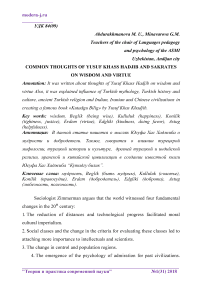Common thoughts of Yusuf Khass Hadjib and Sakrates on wisdom and virtue
Автор: Abdurakhmanova M.U., Minavarova G.M.
Журнал: Теория и практика современной науки @modern-j
Рубрика: Основной раздел
Статья в выпуске: 1 (31), 2018 года.
Бесплатный доступ
It was written about thoughts of Yusuf Khass Hadjib on wisdom and virtue Also, it was explained influence of Turkish mythology, Turkish history and culture, ancient Turkish religion and Indian, Iranian and Chinese civilizations in creating a famous book «Kutadgu Bilig» by Yusuf Khas Khadjib.
Wisdom, beglik (быть мудрым), beglik (being wise), kulluluk (счастье), kulluluk (happiness), konilik (правосудие), konilik (tightness, justice), erdem (добродетель), erdem (virtue), edgliki (доброта), edgliki (kindness, doing favor), astug (любезность, astug (helpfulness)
Короткий адрес: https://sciup.org/140289424
IDR: 140289424
Текст научной статьи Common thoughts of Yusuf Khass Hadjib and Sakrates on wisdom and virtue
Sociologist Zimmerman argues that the world witnessed four fundamental changes in the 20th century:
-
1. The reduction of distances and technological progress facilitated moral cultural imperialism.
-
2. Social classes and the change in the criteria for evaluating these classes led to attaching more importance to intellectuals and scientists.
-
3. The change in control and population regions.
-
4. The emergence of the psychology of admiration for past civilizations.
This admiration was a radical change in mentalities (1,2). As the chef d'oeuvres presented to humanity by the West and the East were better known, the meta-culture identity of Turkish culture was better understood.
This work was influenced by Turkish mythology, Turkish history and culture, ancient Turkish religion and Indian, Iranian and Chinese civilizations There are four basic concepts in «Kutadgu Bilig» :
Yusuf informs us at the beginning of the work (lines 353-58) that it is based on four abstract principles, each of which is represented by one of the four major characters. Each concept is represented by a person and opinions on such issues as the State, politics, society, professions and ethics are expressed during the dialogues among these people.1
Not the plot or form of the book but the content of dialogues determine the importance of «Kutadgu Bilig» .
Yusuf Khass Hajib is the first author of Islamic Turkish Literature (whose work reached us). He was born in the early 11th century in Balasaghun, Turkistan. This town was among a tew civilized centers or the Karakhanid period. Yusuf Khasss Hajib was a well-educated scientist, philosopher and artist who was aware of the importance of wisdom and who thought and wrote well. The center of the government of the Eastern Karakhanid State was Kashgar in 1069-1070. Yusuf stalled writing «Kutadgu Bilig» in Balasaghun and completed it in Kashgar after working for eighteen months on it and presented his work to Karakhanid Sultan, Tavghach Bughra Ebu Ali Hassan bin Soleman Arslan in 1070. «Kutadgu Bilig» is a didactic work written in Hakaniyc Turkish. The intellectual Sultan of the period acclaimed this work and awarded Yusuf with the title of Khasss Hajib (meaning 'top adviser). Like the style of a classical Turkish poem, the work starts with words eulogizing Allah and Mohammed. It consists of 88 chapters and 6645 couplets .
Various opinions are expressed on the literal meaning of the title. According to some researchers, wisdom of happiness and according to some others, wisdom that brings happiness makes people reach happiness in both Earth and Heaven. This wisdom provides human beings with the mentality, knowledge and virtues required for ideally organizing the lives of the individual, community and State which are closely related to each other. "With this work Yusuf created a system of philosophy of life which analyzes the meaning of human life and determines the task of human beings within the community and within the State".
In general wisdom is the product of the relationship between object and subject, resulting from the intentional tendency of the subject. It can be defined as being aware or conscious of something as well as a clear perception of something regarded as accuracy or a task .
Список литературы Common thoughts of Yusuf Khass Hadjib and Sakrates on wisdom and virtue
- Darke H, Translation: The Book of Government (London, 1960; 2d ed. 1978).
- Devereux R., Yusuf Khass Hajib and the "Kutadgu Bilig". (In Muslim Would, 51, 1961, S.229-330).
- Erdal M., Variable Forms in the "Qutadgu Bilig" (In Besinchi Milletlerarasi Tuerkoloji Kongresi. Teblikler, Bd.1G'1,Istanbul 1985,S.79-88).
- Kafiso'glu I, "Kutadgu Bilig" ve kueltur tarihimizde yeri,Istanbul 1980.


